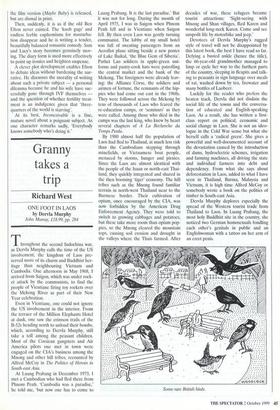Granny takes a trip
Richard West
ONE FOOT IN LAOS by Deryla Murphy John Murray, £18.99, pp. 284
Throughout the second Indochina war, as Deryla Murphy calls the time of the US involvement, the kingdom of Laos pre- served more of its charm and Buddhist her- itage than neighbouring Vietnam and Cambodia. One afternoon in May 1968, I arrived from Saigon, which was under rock- et attack by the communists, to find the people of Vientiane firing toy rockets over the Mekong River as part of their New Year celebration.
Even in Vientiane, one could not ignore the US involvement in the interior. From the terrace of the Million Elephants Hotel at dusk, one saw the crimson trails of the B-52s heading north to unload their bombs, which, according to Deryla Murphy, still take a toll among the peasant children. Most of the Corsican gangsters and Air America pilots one met in town were engaged on the CIA's business among the Mnong and other hill tribes, recounted by Alfred McCoy in The Politics of Heroin in South-east Asia.
At Luang Prabang in December 1973, I met a Cambodian who had fled there from Phnom Penh. 'Cambodia was a paradise,' he told me, 'but now one has to come to
Luang Prabang. It is the last paradise.' But it was not for long. During the month of April 1975, I was in Saigon when Phnom Penh fell and in Vientiane when Saigon fell. By then even Laos was gently turning communist. The lobby of my small hotel was full of sweating passengers from an Aeroflot plane sitting beside a new poster of Lake Baikal, 'the Blue Gem of Siberia'. Pathet Lao soldiers in apple-green uni- forms and pastry-cook hats were patrolling the central market and the bank of the Mekong. The foreigners were already leav- ing: the Alliance Corse, the soldiers and airmen of fortune, the remnants of the hip- pies who had come out east in the 1960s. They were followed across the Mekong by tens of thousands of Laos who feared the re-education camps, or 'seminars' as they were called. Among those who died in the camps was the last king, who knew by heart several chapters of A La Recherche du Temps Perdu.
By 1980 almost half the population of Laos had fled to Thailand, at much less risk than the Cambodians stepping through minefields, or Vietnamese boat people, menaced by storms, hunger and pirates. Since the Laos are, almost identical with the. people of the Isaan or north-east Thai- land, they quickly integrated and shared in the then booming 'tiger' economy. The hill tribes such as the Mnong found familiar terrain in north-west Thailand near to the Burmese border. Their cultivation of opium, once encouraged by the CIA, was now forbidden by the American Drug Enforcement Agency. They were told to switch to growing cabbages and potatoes, but these take more room than opium pop- pies, so the Mnong cleared the mountain tops, causing soil erosion and drought in the valleys where the Thais farmed. After decades of war, these refugees became tourist attractions: 'Sight-seeing with Mnong and Shan villages, Red Karen and wonderful long-neck Karen. Come and see unspoilt life by motorbike and jeep.'
Devotees of Dervla Murphy's rugged style of travel will not be disappointed by this latest book, the best I have read so far. Defying a busted ankle (hence the title), the 66-year-old grandmother managed to limp or cycle her way to the furthest parts of the country, sleeping in fleapits and talk- ing to peasants in sign language over meals of rat, washed down by tea, firewater and many bottles of Laobeer.
Luckily for the reader who prefers the beaten track, Dervla did not disdain the social life of the towns and the conversa- tion of educated and English-speaking Laos. As a result, she has written a first- class report on political, economic and social change in Laos. She is not an ideo- logue in the Cold War sense but what she herself calls a 'radical green'. She gives a powerful and well-documented account of the devastation caused by the introduction of dams, hydroelectric schemes, irrigation and farming machines, all driving the state and individual farmers into debt and dependency. From what she says about deforestation in Laos, added to what I have seen in Thailand, Burma, Malaysia and Vietnam, it is high time Alfred McCoy or somebody wrote a book on the politics of timber in South-east Asia, Dervla Murphy deplores especially the spread of the Western tourist trade from Thailand to Laos. In Luang Prabang, the most holy Buddhist site in the country, she noticed two German homosexuals fondling each other's genitals in public and an Englishwoman with a tattoo on her arm of an erect penis.
Some rare British birds.










































































 Previous page
Previous page